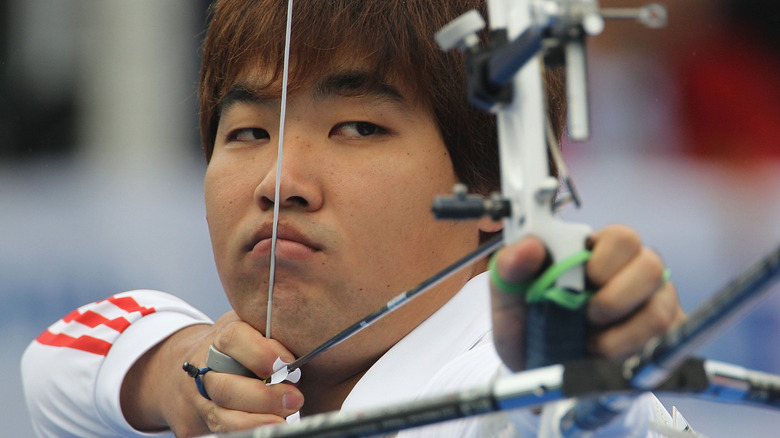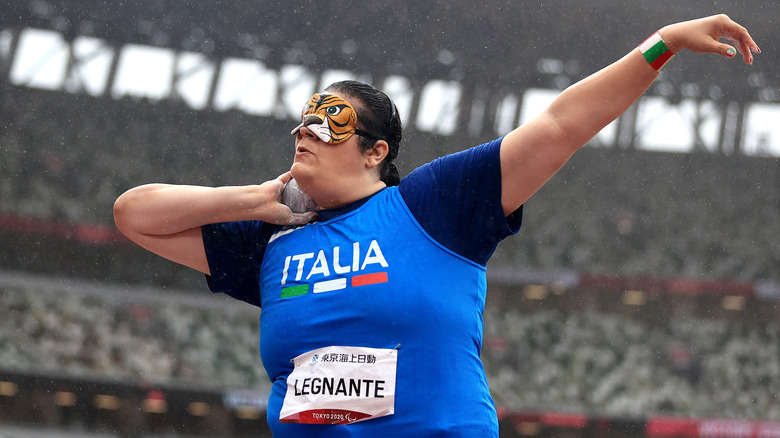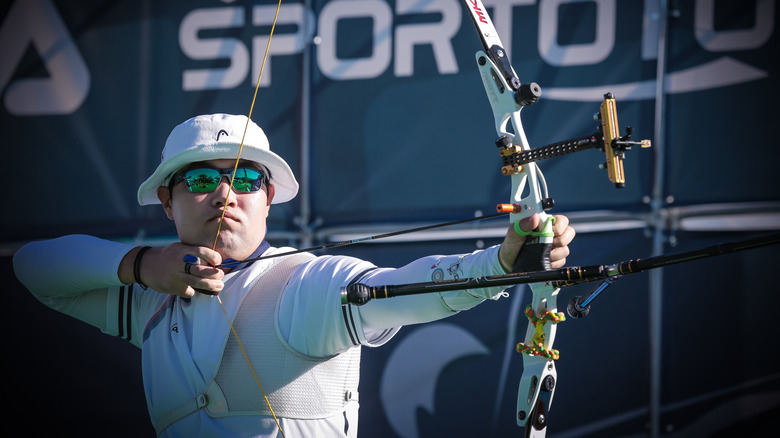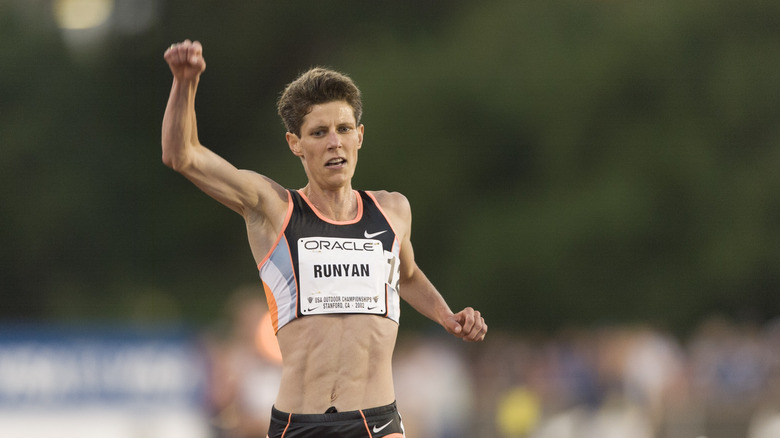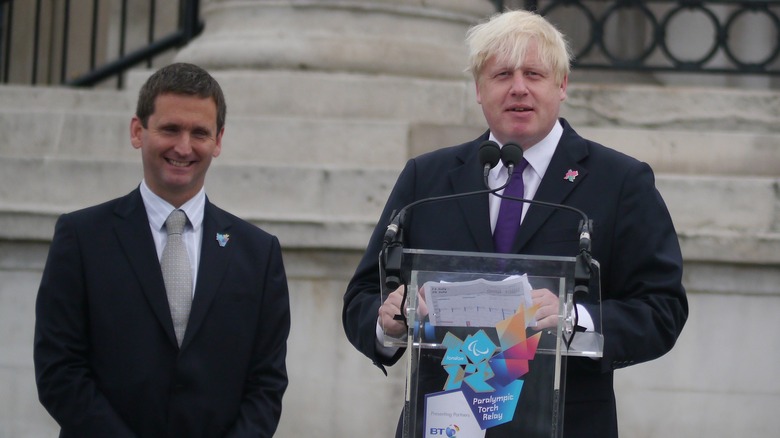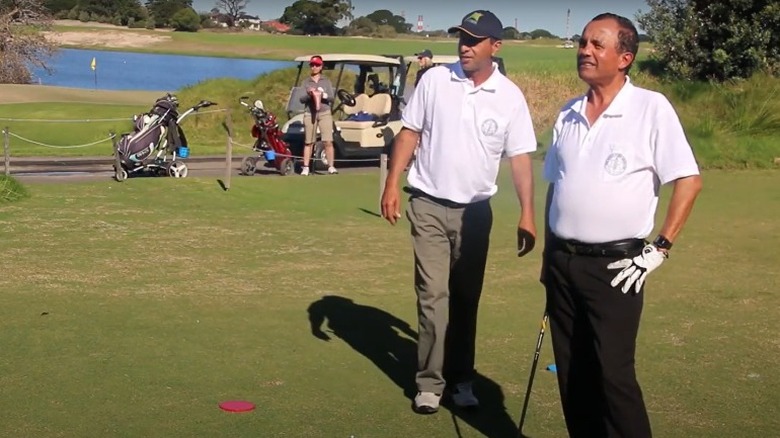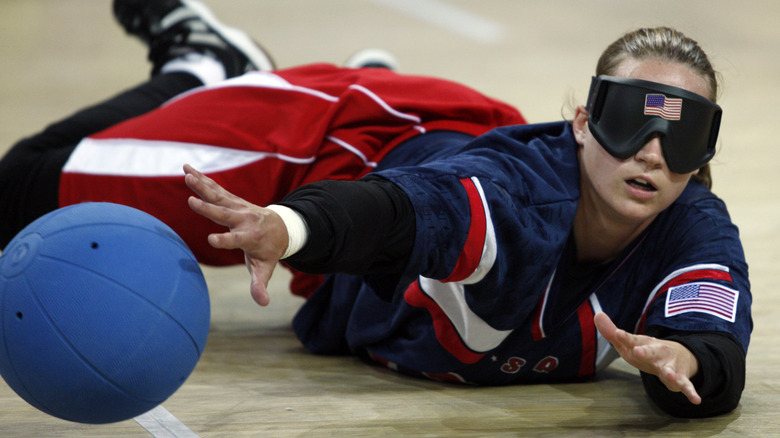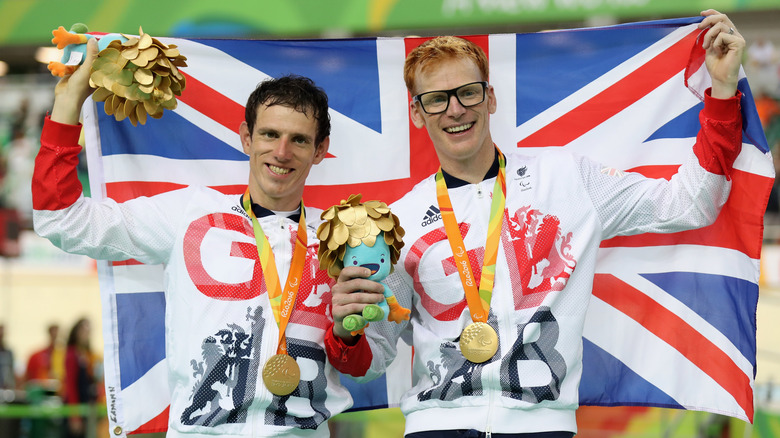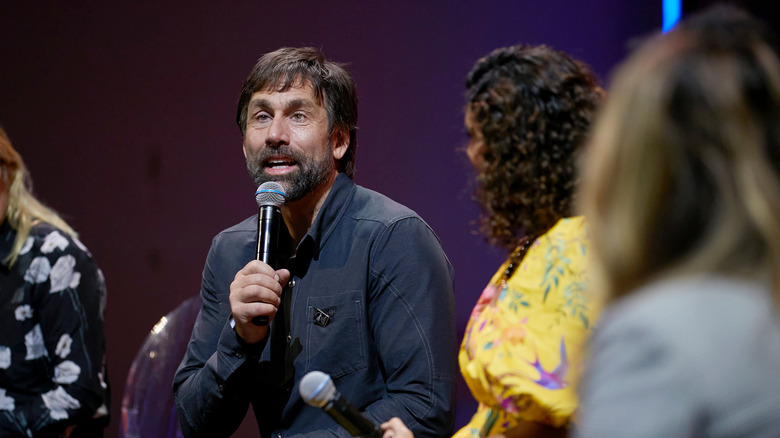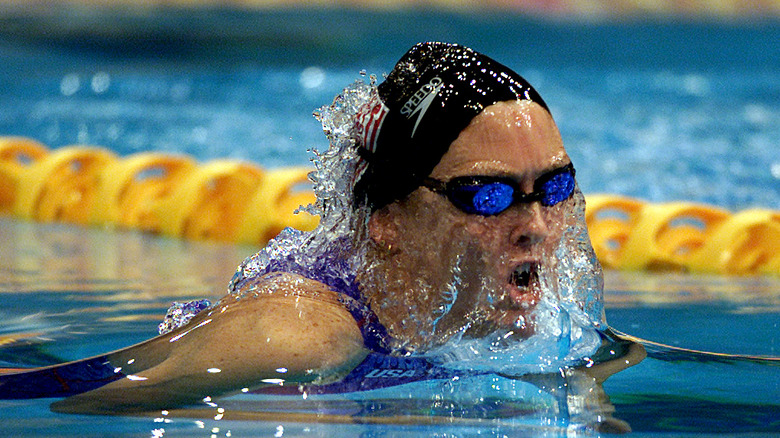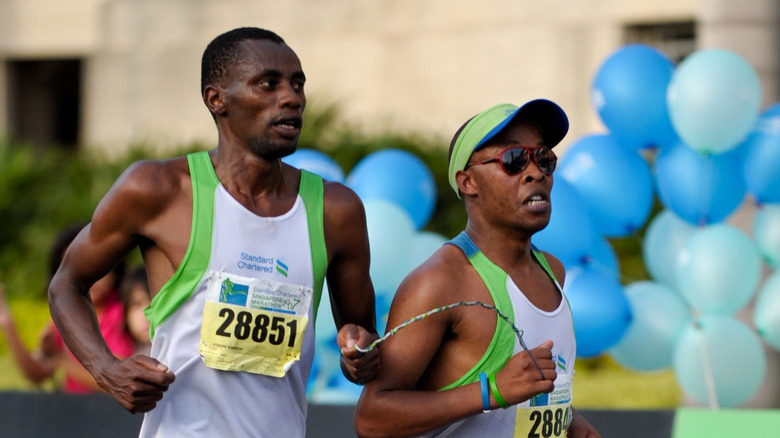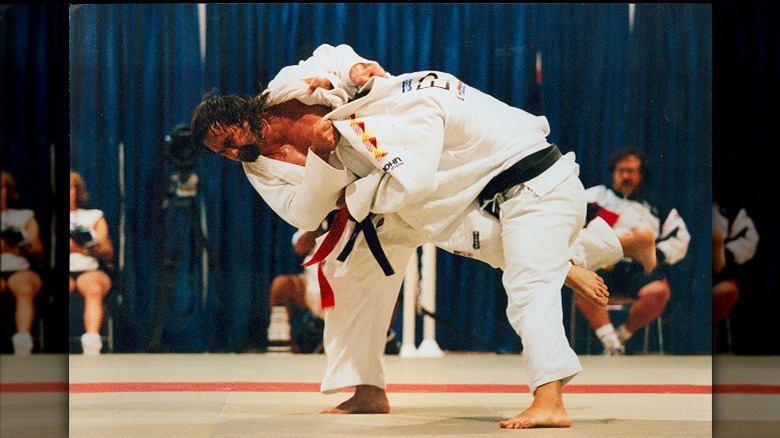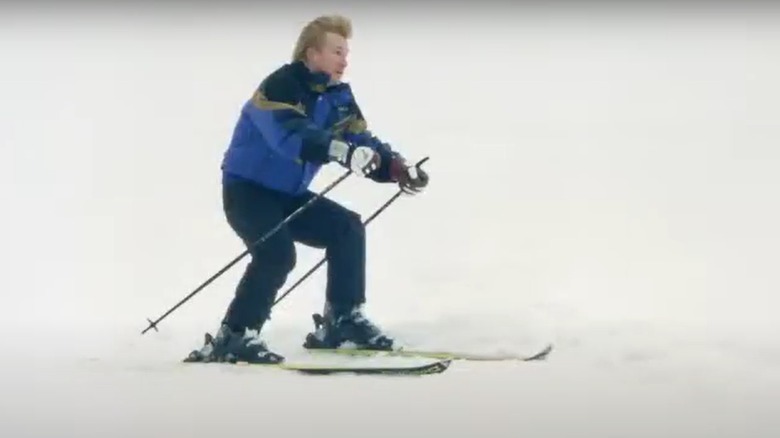The World's Most Famous Visually Impaired Athletes
Rising to the top in any sport is hard enough for an able-bodied athlete. But, every two years, the world gets to witness the added level of strength and talent it takes to dominate in the Paralympics. Of course, those Summer and Winter Games are far from the only display of such talent, but, especially in recent years, they are the ones that reach millions of people around the world. The 2022 Paralympic Winter Games in Beijing just got shy of 12 million viewers in the U.S. alone, according to NBC.
As parasports become more popular, not only are disabilities normalized – hopefully leading to a more tolerant and equitable society – but the achievements of some of the world's greatest athletes get the attention they deserve.
While parasports feature athletes with a wide range of disabilities, let's highlight those with visual impairments. Here are some of the most famous visually impaired athletes in the world.
Assunta Legnante
Assunta Legnante is an Italian Paralympic shot put and discus medalist, with two golds and one silver in the former discipline, and a silver in the latter. Her talent was clear from an early age. She told the International Paralympic Committee, "At school, I started experimenting with different disciplines of athletics, running, jumping, until they put a weight in my hand and the teachers noticed that I was capable."
While Legnante was born with congenital glaucoma, it was not until 2009 that she lost the sight in her right eye, and 2011 in her left. This meant she actually first competed for Italy at the Olympics in 2008, and it wasn't until 2012 that she debuted at the Paralympic Games. To level the playing field, so to speak, between athletes with different levels of visual impairment, they wear eye masks when competing. Legnante has become famous for hers, known as "Diabolik" and "Uomo Tigre" (pictured).
Even though with all her success she could retire proudly, Legnante still plans to keep competing, even hoping to make it to the 2028 Los Angeles Paralympics, when she will be 50 years old. Her reason? Despite all the traveling she's done while dominating the sport, somehow, she's never been to the U.S., and she really wants to go. She told the Olympics Channel, "It sounds silly, but it's my biggest dream."
Im Dong-Hyun
Archery is a sport so difficult and so fine-tuned that even a rapid heartbeat can keep a competitor from getting a bullseye. So it's frankly astonishing that one of the best archers the sport has ever seen is legally blind.
According to The Week, when he broke his own world record at the 2012 London Olympics, Im Dong-Hyun had 20/200 vision in one eye and 20/100 in the other. That's right, he did that at the Olympics, not the Paralympics. So how can he possibly aim so precisely? "With my vision, when I look at the target, it looks as if different color paints have been dropped in water," he explained in 2012, via Yahoo! Sports. "When I look down the range at the target all I can do is try to distinguish between the different colors. If I couldn't see the colors, now that would be a problem."
However, Im wouldn't necessarily appreciate being on this list, simply because he's not a fan of people endlessly talking about his eyesight. He also doesn't want people calling him disabled, saying he finds that "unpleasant." So instead, let's just be very impressed with the fact he is a world record holder and world archery champion who competed in three Olympic Games and medaled in the team archery event in all of them, walking away with two gold and one bronze overall (via World Archery).
Marla Runyan
According to her official website, Marla Runyan made history in 2000, when she made the U.S. track and field team for the Olympics, making her the first legally blind American athlete to compete in that sport. Then she made the team again in 2004. She competed in two Paralympic Games as well, where she won a whopping five golds and one silver, across six different disciplines. In between the Games, Runyan was busy winning championships and breaking records in a very unusual number of distances, running everything from sprints to marathons with ease.
The National Women's History Museum explains that Runyan developed something called Stargardt's Disease when she was 9 years old. While she lost most of her eyesight and is legally blind, she does have some peripheral vision and can "make out shapes and shadows." This allowed her to compete in the Olympics without a running guide, which some visually impaired athletes utilize in the Paralympics.
While Runyan's eyesight has continued to deteriorate over time, this hasn't stopped her on or off the track. She has two master's degrees, per the non-profit Different and Able, and teaches at the Perkins School for the Blind – the same place Helen Keller attended. She also coaches track and field at Northeastern University, and somewhere in there found time to write her autobiography.
Chris Holmes
Chris Holmes swam for England at four Paralympic Games between 1988 and 2000, per his biography at the National Portrait Gallery. He won 15 medals overall, including a record six gold at the 1992 Games. He went on to be Director of Paralympic Integration for London 2012. He was awarded an MBE at just 20 years old, and in 2013 was made Baron Holmes of Richmond.
It's not clear how Holmes lost his sight. Until he was in his teens, he had full sight, then, according to his official bio, he "completely and unexpectedly ... went blind overnight" at the age of 14.
In 2020, Holmes was charged with sexual assault after a massage, where the masseuse claimed he grabbed her in a sexual manner and asked for "extras." Holmes claimed it was a misunderstanding of how he interacts with the things and people around him. "My world would stop here if I couldn't contact that external world that you can get in the blink of an eye, and I try and use everything I've still got to try and construct that world," he explained to the jurors (via Inside the Games). "So, through sound, smells, and, yes, touch, but touch as a means of being able to construct that world, touching objects, and, yes, touching people every single day." The jury would eventually find him not guilty.
Zohar Sharon
Zohar Sharon represented Israel in goalball at the 1980, 1988, and 1992 Paralympic Games, according to the organization's official website. But despite that being more than impressive enough for one lifetime, it's not the sporting achievement he is most known for. NBC News reports that between 2003 and 2014, Sharon won the World Invitational blind golf tournament five times. In 2016, he won it for a sixth time, per The Washington Post. (And it should be noted the competition is only held every two years.) Even more impressive: Until he went blind, Sharon had never played a single hole of golf in his life.
Sharon had use of his full sight until he was in his mid-20s. Then a member of the Israeli Defense Force, The San Diego Jewish Journal reports he was sprayed in the face with a chemical that left him blind in one eye. Three years after that, he suddenly lost the sight in his other one.
While golf was the magic Sharon needed in his life to get out of the deep depression he sank into after going blind, it was far from the only major achievement he managed in that period. First, he attended art college, and his works have been shown in galleries. He also got his degree in psychotherapy. But golf is his greatest achievement, where he manages amazing shots based on sound and the detailed observations of his sighted caddy.
Lisa Czechowski
Goalball is a sport played at the Paralympics but not the Olympics, as it's meant to be played by blind or partially sighted players. (They wear eye masks, so they are all at the same level of sight – none.) Lisa Banta Czechowski is one of the best. According to a profile on PBS, she's been on the U.S. women's goalball team since 1996. While first attending the Paralympics that year as an alternate, she then made appearances when the team won silver in 2004 and gold in 2008. She was, amazingly, still going strong when they won silver again at the delayed Tokyo 2020 Paralympic Games, per the Daily Record. And while goalball has been her focus for decades, she actually started out in track and field, taking home a silver medal in Discus F12 at the 2000 Paralympics.
Czechowski was born with a condition called nystagmus, and as a young teen was also diagnosed with cone dystrophy. While she is not completely blind, her vision at all distances is severely affected, and she sees things only in black, white, and gray.
Czechowski is considered the "team mom" of U.S. women's goalball, and she has the utmost respect from her teammates. Over the years she's won superlatives at major tournaments, including top scorer and MVP. In 2002, she was also selected to participate in the Torch Relay for the Salt Lake City Winter Olympic Games.
Steve Bate
When Steve Bate (pictured right) was diagnosed with Retinitis Pigmentosa and told he was losing his eyesight in 2011 — and that it would only get worse over time — he had to give up on his dream of becoming a mountain climbing guide. But he decided to go out with a bang, and became the first visually impaired person to solo climb El Capitan in Yosemite National Park, according to his official website. The feat took him almost a week, but he calls it "the best experience of my life."
Not that the achievement doesn't have competition, considering what else he's done in his life. According to an interview with the Inside Tri Show, Bate had never even owned a bike until he was in his 30s. But after he could no longer mountain climb safely, he decided to try something new and push himself, which paid off in spades when he was selected for the 2016 Great Britain Paralympic Cycling Team. In cycling events, a visually impaired athlete rides tandem with a sighted athlete; Bate's pilot is Adam Duggleby (pictured left).
Together, the pair has achieved almost every major milestone in their sport. The official Paralympics website records they won gold at the Rio 2016 in the individual pursuit and road time trial disciplines, as well as taking bronze in the road race. Two years later, they became world champions in the individual pursuit. And at the delayed Tokyo 2020 Games, they won silver in Men's Pursuit B.
Erik Weihenmayer
While climbing the world's tallest peaks might seem impossible if you can't see while doing it, Erik Weihenmayer proved otherwise, becoming not only the first blind person to make it to the summit of Everest, according to his official website, but completing the Seven Summits – climbing the tallest mountain on every continent.
While born able to see, retinoschisis meant Weihenmayer started to lose his vision at age 14. He found a love for climbing after he lost his sight, according to an interview with The New York Times. He explained why, as a blind person, climbing was a perfect fit: "It was very tactile. That's what I really loved about it. You can feel all these little knobs and cracks and fissures and little dishes in the rock. So you're problem-solving with your hands and feet as your eyes."
While tackling Everest and being one of only 150 or so people – sighted or visually impaired – to complete the Seven Summits is what he's most famous for, Weihenmayer has plenty of other life achievements. A talented wrestler, in high school, he made it to the National Junior Freestyle Wrestling Championship. As an adult he passed on this love as a middle school teacher and wrestling coach. He started a non-profit, No Barriers, to help others achieve their dreams. And Weihenmayer still loves an adventure: In 2014, he kayaked the entire Colorado River, and in 2021, CBS News reports he rappelled into an active volcano with Will Smith for a National Geographic TV program.
Trischa Zorn
There are those athletes who have dominated at the Paralympic Games ... and then there's Trischa Zorn. In a category by herself, the swimmer won – wait for it – a whopping 55 medals, 41 of them gold, over the course of seven appearances at the Games, according to the United Sates Olympic and Paralympic Museum. She holds the record for most decorated Paralympian, and when asked by Team USA, she modestly explained why that record will probably never be broken. "It's hard to say but just because of the way the Games have evolved, and the way athletes have now become a lot more specialized I think it would be very difficult," Zorn said.
While she went home with very few third-place finishes in her career, one bronze medal is especially precious to her. While training for what would be her final Paralympics in 2004, her mother died of breast cancer. Only a few months later, at age 40, Zorn won her only medal of those Games, a bronze in 100-meter backstroke. "She had always attended all my competitions and it was hard to know she was not going to be there," Zorn said. "It was a tribute to my mom."
According to Mississippi State University, over the course of her career, Zorn broke 12 records in the pool. The swimmer has since been inducted into the International Paralympic Hall of Fame, as well as earning a law degree. And she was one of the first people to receive artificial irises, allowing her some vision for the first time in her life.
Henry Wanyoike
Next time you're feeling really unmotivated, think of Henry Wanyoike (pictured right), who broke the visually impaired marathon world record. Twice. In one week. Really puts tackling your inbox in perspective, doesn't it? According to Laureus, on April 17, 2005, Wanyoike ran the London Marathon in 2 hours, 32 minutes, and 51 seconds. Exactly a week later, in Hamburg, Germany, he broke his own very fresh record with a time of 2 hours, 31 minutes, and 31 seconds.
The Kenyan was born with his sight, but when he was 21, Wanyoike suffered a stroke in his sleep. "I went to bed a normal person, the following day I found myself in darkness," he said (via Scotch College). At that point, he'd already been training as a runner for years, and looked set to join the other track and field greats his country had produced. When he lost his sight, Wanyoike thought that dream was over, until a doctor explained that visually impaired runners can use sighted runners as guides to assist them.
According to the International Paralympic Committee, Wanyoike has won eight medals in track and field events at the Games, five of them gold. He's dominated marathons around the world. He's also won Kenyan Sports Person of the Year, and been honored with his country's highest civilian award, the Order of the Golden Heart. These days, Wanyoike gives back through his own foundation, as well as working with other nonprofits to assist visually impaired people throughout Africa.
Anthony Clarke
Anthony Clarke became the only Australian – either sighted or visually impaired – to win gold in Judo at the Olympics or Paralympics, which he did at the latter in 1996, according to Paralympics Australia. A year later, per Clarke's official website, he was honored with The Order of Australia Medal.
Born with his sight, Clarke became blind in a car accident in 1987, when he was 17. According to an interview with Judo Australia, Clark only started learning judo after he lost his sight for fun, and didn't even know it was a Paralympic sport. But once he learned it was, he competed in the next five Paralympic Games. He had the time of his life, telling Paralympics Australia about the feeling staying in the Olympic Village, "You're there with four or five thousand of the most motivated people in the world. It's a tremendous buzz. When you're around so many people who are so positive, it's just a fantastic feeling."
Clarke's life post-competition followed some tradition and some very not traditionally routes. For example, he became a judo coach and an inspirational speaker. On the other hand, he wrote a musical and became a dog masseur. Perhaps these quirks are to be expected from a man who, after he got his first guide dog, took it hitchhiking around Australia.
Craig MacFarlane
In 1985, The New York Times described Canadian-American Craig MacFarlane as "probably the world's most accomplished blind athlete" and "certainly the most versatile," considering he had major accomplishments in at least seven types of sport. The first discipline he dominated was wrestling, where his record was so good that the only thing to keep him from making the 1980 Moscow Olympics was the fact Canada was part of the boycott that year and didn't attend. He made up for it in other ways, winning 103 gold medals in sports around the world, according to his talent agency bio.
MacFarlane was born with full sight but became completely blind when he was only a toddler, after sparks from a welding torch he was playing with got in his eyes. He calls this turn of events "just a minor inconvenience."
On his official website, MacFarlane has quotes from many famous friends and acquaintances, including Wayne Gretzky and Mario Andretti, as well as the late iconic sports announcer Howard Cosell, who called MacFarlane "the most remarkable athlete I have ever seen" in 1986. While MacFarlane's overall web presence these days seems to be mostly about selling himself as an inspirational speaker for hire, there's nothing wrong with being openly and loudly proud of his accomplishments. As he told The New York Times, "If you don't believe in yourself, how can you expect other people to believe in you."
